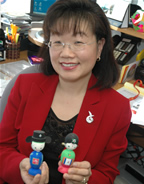Returning Home
Korean-Born Educator Researches Perceptions of Language and Culture
February 20, 2007
By Debra Cano Ramos
Korean-born Grace Cho knows the value of keeping her native language alive and holding onto her centuries-old culture.
“Developing one’s ‘heritage,’ or family, language helps individuals retain their ethnic identity. Knowing two languages and cultures also helps to minimize intergenerational conflicts within families,” said Cho, associate professor of secondary education who specializes in language and literacy.
Contrary to popular opinion, immigrants to the U.S. are acquiring English rapidly, but at the same time, they are losing their native or “heritage” language, Cho said.
“Studies have shown that maintaining one’s heritage language, in addition to learning English, has cognitive, social and cultural benefits.”
Cho’s current research has shown that immigrant children lose a great deal when their heritage language is not developed. They lose the means by which to gain the wisdom and life experiences of their parents, their elders and their community. Further, noted Cho, developing one’s heritage language ensures strong parent-child communication.
“It is an excellent investment for both the individual and society,” said the mother of a 4-year-old who wants her American-born daughter to speak Korean — and to help other immigrant children in this country keep their “heritage language.”
“It’s important to me that my daughter speak the Korean language and learn about her culture. Besides the practical, career-related and cognitive advantages of being bilingual, developing Korean will increase my daughter’s respect for her heritage culture and provide her with a healthy sense of biculturalism.”
As a Korea Foundation field research fellow, Cho has embarked on a research project to determine the most effective ways to promote the understanding of one’s roots, language and ethnicity. The Korea Foundation is affiliated with the Ministry of Foreign Affairs in South Korea.
This semester — while on sabbatical — Cho is conducting research preliminary to a three-month stay in the Korean capital of Seoul, and Busan, the country’s second largest city, to conduct field research. It will be the first time in 10 years that she visited Korea where she has extended family.
Researching Perceptions
Cho will collect data on the perceptions of Korean Americans visiting Korea in regard to their heritage, homeland, culture and heritage language maintenance. She will tackle questions such as “Did visiting Korea increase their cultural awareness and the likelihood of their intention to practice and use the Korean language?” and “Does visiting Korea promote cultural understanding and appreciation leading to understanding one’s roots and ethnicity?”
She also will be observing short- and long-term language and cultural exchange programs to determine their effectiveness in promoting the Korean language and culture for second-generation Korean Americans.
Victoria Costa, chair and professor of secondary education, believes Cho’s research promises to be important in both the U.S. and Korea. “It is an exciting and innovative approach to understanding issues associated with heritage language learning.
“Korean Americans are one of the most rapidly growing ethnic groups in the United States, as well as in Orange County,” she added.
There are more than 1 million people of Korean ancestry in the U.S. In California, the Korean population is more than 345,000, an increase of 33 percent since 1990.
The loss of their heritage language is contributing to a communication and ideological gap between first- and second-generation Koreans, Costa noted. “This disruption in family patterns has critical consequences for engaging and supporting Korean American students in schools and classrooms.”
Cho’s research “will be of value by helping to mitigate these consequences. Her research will inform policy and practice in, as well as future research on, teacher preparation, bilingual education and K-12 student learning.”
Collection of this type of data is not only necessary to understand Korean language programs in Korea, noted Costa, but also to help understand the perspectives of Korean-American adolescents in these programs. What Cho theorizes and finds through her research will be applicable to heritage language learning of all languages, said Costa.
Sharing Experiences
Cho lived in Korea until she was 9, when her parents moved the family to Argentina. Her father, a Presbyterian missionary, founded a Korean newspaper, language school and church in Buenos Aires. Living in another country resulted in culture shock for her and her three siblings.
“It was hard to assimilate into the Argentinean culture and to learn the Spanish language,” she recalled. “The school experience was difficult because of the cultural and language barriers.”
Cho eventually learned Spanish, graduated with honors from elementary school and attended junior high school before her family moved, when she was 14, to Los Angeles, where she experienced yet another cultural and language transition.
She admits personal experiences gave her the opportunity to become trilingual in Korean, Spanish and English and the inspiration to pursue study in language development. Her experiences also served to motivate her research efforts.
Cho was moved to put together a book about immigrants’ experiences. She and her mother, Sara Cho, are co-editors of “Studying Abroad at an Early Age” (“Jo gi Yu Hwak,” 2002). The book, written in Korean, explores the experiences of studying abroad as a child from U.S. residents’ and foreign students’ perspectives. It also contains personal essays on immigrants’ experiences living in foreign countries and other educational issues.
A former schoolteacher in Los Angeles, Cho earned her doctorate in education with an emphasis in language, literacy and learning from the University of Southern California in 1998. She became a member of CSUF’s faculty in 2000 and is the CLAD (cross-cultural, language and academic development certificate program) coordinator for secondary education.
She hopes her research will help her in training pre-service and in-service teachers.
“My teaching will be based on theory and research, coupled with real world problems, as well as on how to better train our prospective teachers in dealing with culturally and linguistically diverse students.”

